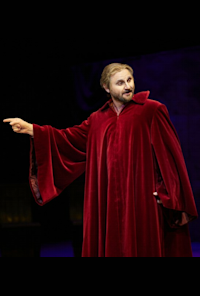Suor Angelica
The plot of the one-act opera Suor Angelica unfolds in a convent; it comes as no surprise that in this opus there is not one solo male voice. Apropos, nothing prevented Giacomo Puccini and his librettist Giovacchino Forzano from including, for example, the figure of some priest or jilted lover in the plot. Puccini, however, was consciously writing a deeply feminine opera, moreover not merely with regard to the tessitura: Suor Angelica is a musical drama about a woman’s psyche, about the mystery of the “eternal feminine”, about the power of a woman’s emotions, not passionate but maternal.
The sisterhood isolated beyond the walls of the convent is initially presented as a group portrait. A May day, a garden with a fountain, birds and bells ringing: at first glance, the convent seems like heaven on earth. Gradually, the focus narrows and different types and personalities emerge. Finally, at the centre of attention there is Sister Angelica – the daughter of noble parents who at some point in the past scandalised her family through an illicit liaison. The delicate, pastoral and at times utterly impressionistic sound palette is replaced by a tense psychological duel, followed by a stunningly expressive monologue of a mother who for the second time – now irretrievably – has lost her child and, with that, any meaning of life.
Throughout the opera there flows the theme of guilt and forgiveness: from charming pranks (like giggling while working or a rose tucked inside a sleeve), the cost of which is a prayer “out of turn”, to the gravest sin of suicide, atoned for by the torments of the heroine and her love for her son. The woman with no compassion – the Princess – is transformed into a weapon of Hell; she is opposed by the heavenly image of the Mother of God, perfect in her all-forgiving love. The emotional depth of the opera is colossal, it is in vain to resist the force of its influence, and tears in the auditorium are inevitable – as Puccini had wished.
When working on the score, the composer used all the richness of the sound scale of the early 20th century, including a luxurious late-Romantic orchestra with celesta, harp, bells and organ. The transparent chamber episodes are interwoven with elements of breathtaking tutti; the necessary Catholic entourage is created by echoes of a Gregorian chorale. The jewel in the crown of the opera is Sister Angelica’s aria Senza mamma, one of the most beautiful soprano arias in the international repertoire.
It remains but to guess why the public did not immediately see the merits of Suor Angelica: at the premiere, which took place at the Metropolitan Opera on 14 December 1918, it was overshadowed by the other parts of Puccini’s Il trittico – Il tabarro and Gianni Schicchi. The composer considered it to be the finest of the three.
In the Soviet Union Suor Angelica remained banned due to the religious motifs in the plot; only the first and third parts of Il trittico were performed. In 2003 at the Mariinsky Theatre – for the first time in Russia – Puccini’s triptych was staged in its entirety. The team behind the production – compatriots of the opera’s creators – avoided absolutely all melodrama and sentimentality. It is a monochrome, minimalistic production, where the convent is rather more reminiscent of a prison: there are neither roses nor a fountain, only bare grey walls. From the very start the sisters are disunited: even when talking they remain distant from one another, each in her own loneliness. The cold set designs contrast with the vivid emotional quality of Puccini’s music. The production team (stage director Walter Le Moli, designer Tiziano Santi and music director Gianandrea Noseda) remind the audience that this opera about a convent in the 17th century was written during the years of the First World War, at the time of a historic cataclysm, when the loss of that which is most precious – one’s family and the meaning of life – was a bitter reality of the age. Khristina Batyushina
Gianni Schicchi
Forging a will is a criminal offence, but what if some desired good is about to escape one’s grasp for that of another? And there are many others: the dead man has left no direct heir. In the fight for his property, an aristocratic family is transformed into a band of scammers; not only is the will a forgery, but so is the testator! But the scammer may also have been made a fool of – if an experienced rogue deftly replays a game of cheating for his own ends.
The plot of Giacomo Puccini’s one-act opera Gianni Schicchi seems to be rather grotesquely macabre, though in life such things do happen, at least according to Gemma Donati, a representative of a respected Florentine family and the wife of Dante Alighieri. A certain actual real-life Gianni Schicchi once had Gemma’s relative wrapped around his little finger, just like his operatic namesake. Dante sent his offender straight to the eighth – and second last! – circle of Hell. The playwright and librettist Giovacchino Forzano also found a forger there. He made a scoundrel into a charming rogue, one of the gente nuova (“new men”), a man of the future, contrasting Gianni Schicchi’s strong peasant roots with the fecundity of the Buoso family, artistry, free-thinking and ingenuity with greed, arrogance and hypocrisy. In his work Forzano relied not only on lines from the thirtieth song from Hell but also on detailed comments to La divina commedia, which were published in abundance in Italy in the late 19th and early 20th centuries. The libretto turned out to be magnificent: compact, dynamic, dramatically justifiable and also with vivid Italian colours, referring back not only to Dante but also to Boccaccio and to the tradition of folk teatro dell’arte.
In Puccini’s art Gianni Schicchi stands apart: it is the only comic opera in the maestro’s legacy and one of the finest opere-buffe of the 20th century. According to the laws of the genre, the plot unfolds in the ensembles; in essence, this entire hour-long opera is a large, complex and virtuoso ensemble. Reading the list of characters in the programme, it is initially difficult even to understand who comes to whom and how, and yet as soon as the characters begin to appear on the stage (and everyone goes to the start of the treasure hunt at the same time), thanks to Puccini’s music everything very quickly becomes clear. In just a few strokes of the pen, the composer succeeds in writing down the personality traits of each of them. The musical fabric is imbued with leitmotif themes, capacious ostinato motifs that bring together an entire kaleidoscope of faces and situations. One of the most witty and significant is the leitmotif of “grief” that opens the opera with exaggerated second-long sobs and sighs depicting the lamentations of “inconsolable” relatives.
In all of this dark comedy there is also a lighter side – one of the Buoso family nevertheless understands that it is in love and not in money that happiness is to be found. If Puccini uses the modernist musical language of the early 20th century that is sharpened by dissonances for satire, then the lyrical pages of the opera are filled with melodious beauties that are so delightful that an involuntary thought creeps in: but isn’t the soft, ironic smile of an already middle-aged master hiding here too? Let’s say, in the famous aria of the young Lauretta Schicchi who – ah! – will throw herself in the river if her father will not help her be reunited with her beloved.
At the Mariinsky Theatre Gianni Schicchi is performed the same evening as Suor Angelica; the Italian production team has brought the parts of Il trittico to a common artistic denominator. On the stage it is dark, and all of the Buoso family are dressed in black: birds of a feather, it can be seen immediately. “Playing” against the blacks are the reds, the Schicchi family. Ultimately, the entire flock of crows is driven away, and then the huge window bursts open. This is ensured by a comment by the composer: a young man and a girl admire Florence and dream of an earthly paradise. Audiences at the first performances in 1918 understood them like nobody else: the First World War had only just ended, and hope had emerged that the very worst was behind them. The futurological prognosis of the modern-day production team, alas, is much more careful. Khristina Batyushina


